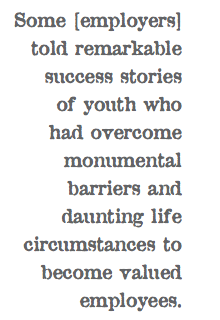Not all homeless people are unemployed, but for those who are, finding a job can be extremely difficult. Employers tend to choose from applicants who appear traditionally reliable with gapless resumes, permanent addresses, professional wardrobes and high levels of education.
These are all things many homeless people struggle to achieve. Given that employment and income is crucial in securing housing, it’s is incredibly important for homeless people to work. Fortunately, there are many reasons why employers would want to — and do — hire people who are homeless.
Personal investment
Many employers, especially those in social enterprises — businesses created more for social good than explicit profit—have some connection to homelessness, mental health issues, poverty, addictions or other problems that can contribute to marginalization. This makes them more likely to offer opportunities to marginalized people.
Veronika Scott, whose parents struggled with substance abuse and unemployment, says no one thought she was worth anything. Despite not doing well in school, she went to college and had an idea: She wanted to make coats that turn into sleeping bags to give away to homeless people in Detroit. As reported in Forbes, one homeless woman told her: ”If you really want to help us, it’s great to have a coat to stay warm, but what we really need is to be employed.” And so her business, The Empowerment Plan, hires women from homeless shelters as full-time seamstresses.
Scott was told that she’d be lucky if anyone ever showed up, never mind made a coat. The Empowerment Plan has been very successful, and most employees are able to move into their own apartment after three months. In her talk at the 2014 Forbes Women’s Summit, Scott says she valued being given a chance in college, and recognized the importance of extending it to others.
This was also important to the Kelleys in Fort Collins, Colorado, who opened RedTail Coffee with a goal of hiring homeless and low-income applicants from the surrounding Red Tail Ponds housing project. Their business was created, according to ThinkProgress, to challenge the negative attitudes exhibited by some of their neigbours when the project was announced.
“It’s been a very positive experience thus far,” Seth Kelley told ThinkProgress. “It’s definitely opening up the eyes of people who live in the area.”
Other motivations
More motivations were highlighted in Raising the Roof’s Private Sector Engagement Project, which went beyond social enterprises. The project connected homeless youth, community agencies, and private sector employers. In the organization’s 2012 report “It’s Everybody’s Business: Engaging the Public Sector in Solutions to Youth Homelessness,” author and researcher Amanda Noble summarized three top reported motivations from the private sector participants.
1. Giving back
Most participants in the program said companies have a responsibility to social problems like homelessness. 45.2% (nearly half) said their primary motivation was to “give back to their communities, and help marginalized youth maintain employment.”
2. Good for business
25.8% said their involvement was “good for business.” Having extra employees around during peak periods was beneficial for some participants, while others appreciated being eligible for wage subsidies as they helped offset the cost of training new employees.
3. Positive partnerships
19.4% of the program participants said partnering with a reputable community agency was their primary motivation. Working with agencies provides the training, screening and support that many homeless people need to get a job, so good relationships with agencies can lead to successful placements and positive associations.
Another motivation not explicitly listed in the report is good corporate image. According to The Guardian, young people care more about job fulfillment and meaning than finances; and in Nielsen’s latest consumer survey, sentiment towards “socially responsible” companies is growing. With more and more people invested in social change, more employers might be motivated to give opportunities to people who are homeless.
Resources
If you or someone you know is interested in hiring someone who is homeless, reach out to a local community agency and learn about their employment programs.
For hiring homeless youth, Raising the Roof has a helpful toolkit for employers that goes over the risks and benefits. (Hint: There’s more benefits than risks!)
This post is part of our Friday "Ask the Hub" blog series. Have a homeless-related question you want answered? E-mail us at thehub@edu.yorku.ca and we will provide a research-based answer.


